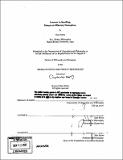| dc.contributor.advisor | Alex Byrne. | en_US |
| dc.contributor.author | Batty, Clare (Clare E.) | en_US |
| dc.contributor.other | Massachusetts Institute of Technology. Dept. of Linguistics and Philosophy. | en_US |
| dc.date.accessioned | 2008-05-19T16:10:08Z | |
| dc.date.available | 2008-05-19T16:10:08Z | |
| dc.date.copyright | 2007 | en_US |
| dc.date.issued | 2007 | en_US |
| dc.identifier.uri | http://hdl.handle.net/1721.1/41703 | |
| dc.description | Thesis (Ph. D.)--Massachusetts Institute of Technology, Dept. of Linguistics and Philosophy, 2007. | en_US |
| dc.description | Includes bibliographical references (p. 66-76). | en_US |
| dc.description.abstract | This three-paper dissertation focuses on olfactory perception, with each paper exploring an ongoing debate in the perceptual literature through the olfactory 'lens'. Philosophers of perception have typically assumed what I call the Unification Thesis: the thesis that certain philosophical issues about perception should be settled in the same way for each of the sensory modalities. I argue that olfaction presents special challenges to the Unification Thesis. Meeting these challenges rewards us with new insight into three topics: 1) the nature, and extent, of representational content, 2) qualia and the alleged transparency of experience and 3) the nature of the secondary qualities. In the first chapter, I consider the challenge that olfactory experience presents to upholding a representational view of the sense modalities. It is commonplace to suppose that visual experience is representational. But, given the phenomenology of olfactory experience, it is difficult to see how a representational view of it might go. I take on the challenge and argue for a representational account of olfactory experience that honors its phenomenology. In the second chapter, I consider what olfactory experience can tell us about the controversy over qualia and, in particular, the argument against them that focuses on the alleged transparency of experience. Although most transparency theorists claim that transparency holds for all of the sense modalities, transparency seems unintuitive for olfactory experience. I argue that olfactory experience is indeed transparent and that explanations of what transparency is supposed to be have been obscured by a reliance on the visual model. | en_US |
| dc.description.abstract | (cont.) In the final chapter, I turn to the question of what smells are. For many philosophers, the view that colors can be explained in purely physicalistic terms has seemed very appealing. In the case of smell, this kind of view has seemed less appealing. Philosophers have been drawn to the view that the nature of smells must be explained in terms of our subjective reactions. In this chapter, I consider a contemporary argument for this view for the case of color. I argue that physicalistic views of smell have nothing to fear from this argument. | en_US |
| dc.description.statementofresponsibility | by Clare Batty. | en_US |
| dc.format.extent | 76 leaves | en_US |
| dc.language.iso | eng | en_US |
| dc.publisher | Massachusetts Institute of Technology | en_US |
| dc.rights | M.I.T. theses are protected by
copyright. They may be viewed from this source for any purpose, but
reproduction or distribution in any format is prohibited without written
permission. See provided URL for inquiries about permission. | en_US |
| dc.rights.uri | http://dspace.mit.edu/handle/1721.1/7582 | en_US |
| dc.subject | Linguistics and Philosophy. | en_US |
| dc.title | Lessons in smelling : essays on olfactory perception | en_US |
| dc.title.alternative | Essays on olfactory perception | en_US |
| dc.type | Thesis | en_US |
| dc.description.degree | Ph.D. | en_US |
| dc.contributor.department | Massachusetts Institute of Technology. Department of Linguistics and Philosophy | |
| dc.identifier.oclc | 221973139 | en_US |
